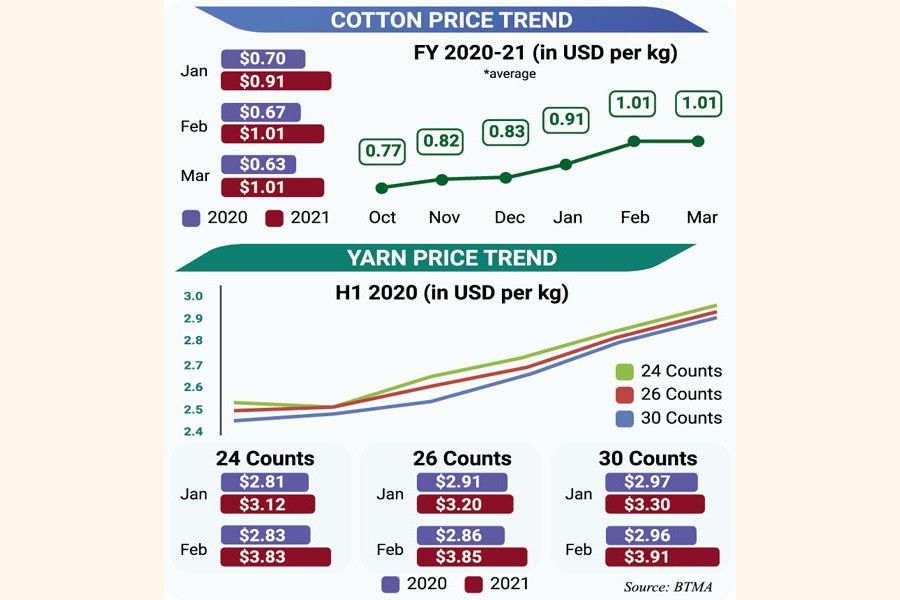Sustained hike in the global cotton prices in recent months are dealing a blow to the country's textile and readymade garment (RMG) industry that is already hit hard by the pandemic, sector insiders said.
To make the matters worse, spinning mills have enhanced locally produced yarn prices, on an average, by over US $1.50 per kg, they said.
Referring to that, RMG makers said the rising local yarn prices were putting an additional burden on them at a time when the industry was yet to recover fully from the impact of Covid-19 pandemic.
Local millers have raised the yarn prices in the domestic market taking advantage of the coronavirus outbreak, said the RMG makers, adding that the hike in prices of raw materials were eating up the competitiveness of the locally manufactured garment items.
However, spinning mills attributed the hike in cotton prices to rising demands for the item globally and its supply crunch, and upward costs of other related logistics followed by the Covid-19 induced lockdown.
These factors have made the global cotton market volatile resulting in the increased cost of yarn manufacturing locally, added the millers.
Meantime, Bangladesh Garment Buying House Association (BGBA) said they were also facing difficulties in marketing locally made apparel items due to the 'unusual' rise in local yarn prices.
Terming the increase in local yarn prices 'unusual', the BGBA in a letter to the Bangladesh Textile Mills Association (BTMA) on March 15 wanted to know the reason behind the hike.
Its president Kazi Iftekhar Hossain in the letter said the global garment trade has been mostly affected by the coronavirus outbreak. The losing competitiveness of the local industry is yet another factor.
It has become difficult to retain the global RMG buyers due to the sustained rise in yarn prices, said Kazi Iftekhar.
Asked, Bangladesh Textile Mills Association (BTMA) president Mohammad Ali Khokon said the Covid-19 pandemic had affected not only the local RMG industry but also the primary textile millers.
Prices of yarn largely depend on cotton as the cotton price takes up more than 60 per cent of the yarn production cost, he said.
Moreover, the global cotton market was 'unstable and upward' during the last few months.
Besides, China has purchased a large quantity of cotton from the US and India, he said, adding that the prices of cotton and yarn were higher in the cotton-producing countries like India and Pakistan.
The lockdown has pushed up the use of cotton-based garment items especially the knitted ones, said Mohammad Ali Khokon, attributing the cotton price hike to the demand and supply gap.
According to BTMA, cotton was being traded on an average US$ 0.60 to $0.85 per kg during June to December last year which now ranged between $0.95 and $1.7 per kg in March this year.
Echoing the president, BTMA secretary Monsoor Ahmed explained that due to the Covid-19, cotton harvest had been affected while the pandemic-induced lockdown had pushed up the related trade costs including logistics like shipping and container charges.
Nurul Islam, chairman of Well Group, said the price of raw materials had skyrocketed while costs of logistics had also gone up.
They have to pay US$ 4,000 per container which was $ 900 to $ 1,000 just a few months back, he explained.
Both the spinners and RMG makers are affected and the impact is still unknown as none can predict what would happen in coming months, he said.
Talking to the FE, Fazlee Shamim Ehsan, director of the Bangladesh Knitwear Manufacturers and Exporters Association (BKMEA), said yarn price had now increased to $4.0 per kg, which was $2.50 in October and November last year.
They could not maintain their quoted price to buyers as the yarn price increased within the shortest span of time, said Fazlee Shamim, adding that buyers did not pay for the enhanced cost.
Secondly, he said, they are getting less fresh orders when they negotiate buyers keeping into consideration the enhanced yarn price.
Moreover, buyers are offering lower prices, asking for discounts, and deferring shipments and payments citing the Covid-19, he added.
"As a result, we are incurring losses. Despite those, a good number of apparel makers are taking orders less than their production cost mainly to continue their business and pay workers," Mr Ehsan explained.
When asked, Bangladesh Garment Manufacturers and Exporters Association (BGMEA) president Dr Rubana Huq said at a time when they needed to beat their competitors, rising yarn prices would kill that potential.
According to BTMA, some 425 spinners out of its total 1,461 members provide around 90 per cent yarn demand for knit and 35-40 per cent yarn demand for woven items exports.
The country annually spends US$ 3.5 to $4.0 billion in importing around 8.0 million bales of cotton.
It imports cotton mainly from African countries, India, Australia and the USA while Brazil was added to the importing country list in recent years, according to BTMA.
Bangladesh annually produces only 0.16 million bales of cotton.


